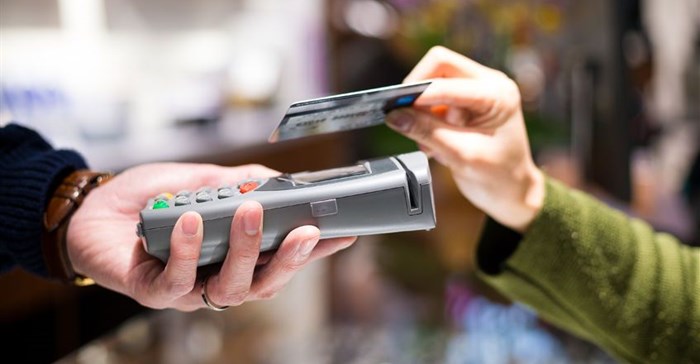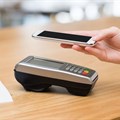Standard Bank records surge in digital payments adoption

Over the six-month period, 20% of all credit card transactions by Standard Bank customers were done online – while 17% were contactless payments (against a 7% baseline pre-lockdown) – meaning the purchases were made using tap-to-pay or via a mobile device. Contactless payments have continued to rise month on month, and Standard Bank expects the trend to continue.
“We witnessed a dramatic shift in behaviour around payments during the lockdown period. With concerns over Covid-19, consumers opted to make payments via online banking and our mobile app banking or by using the tap-to-pay functionality,” explains Ethel Nyembe, head of card and payments at Standard Bank.
E-commerce growth
Standard Bank’s data also showed that there was an 84% increase in the value of online spend at supermarkets and grocery stores year-on-year (y/y) while the increase in value of spend at online general merchandise stores increased by 458% y/y. Not surprisingly, the online purchasing of airline tickets decreased by 74% y/y.
Similarly, contactless spend at petrol stations increased by 608% y/y, by 179% y/y at wholesalers, and 137% y/y at supermarkets and grocery stores.
Nyembe explains: “Right from the start of the pandemic in South Africa we encouraged our customers to adopt to our digital banking solutions. As a result of this, and the necessity to modify their behaviour because of changing living circumstances, we saw an increase in digital adoption. Many consumers now trust digital payment solutions, and we expect them to continue to use these moving forward.”
Standard Bank has seen an increase in the use of its virtual cards, which can be accessed and set up via the Standard Bank App. Clients can select from a range of digital cards to make purchases online with popular e-tailers without having to expose their credit or debit card details. The cards offer the ability to top up for online purchases or physical cash withdrawals, giving users peace of mind that over-spending will not happen on the card.
“The rate of adoption is encouraging and demonstrates the evolving consumer need for digital solutions to transact. Enabling fast, frictionless and safe payments is key, especially in the current environment where there is reluctance to deal with cash,” Nyembe says.
Category spend online
Retailers that experienced a boom in online purchases over the six months include bookstores up 292% y/y, and clothing and accessory stores up 103% y/y. There was also an increase in the percentage of charitable donations made which was up 56% y/y. Online spend on universities and colleges was down 14% y/y, however.
Point of sale spend increased by 30% y/y at grocery stores and supermarkets, 25% y/y at hardware stores, 30% y/y at computer and electrical stores, and 34% y/y at nurseries and florists.
Spending was down 7% y/y at barbers and hair salons, 42% y/y at watch and jewellery stores, 10% y/y at clothing and accessories and 79% y/y on local travel, including airlines hotels, car rentals and travel agencies.
In line with the upswing of digital adoption, there was a 15% decrease in total value of cash transactions over the lockdown period. Again, digital solutions enjoyed significant growth over the period with the total value of SnapScan spend up 15% since the start of lockdown, Instant Money was up 6% and the spend on MasterPass was up 30%.
The benefits of contactless solutions extend beyond health and safety, Nyembe says.
“Contactless payments offer a secure way to purchase goods and services. Further to that, businesses that adopt these methods can access a wider customer base as it enables them to accept payments from anywhere in the world. The shift to serving customers through an online or mobile banking model has demonstrated the potential of innovative digital technology.”
Need for heightened security
However, Standard Bank notes that vishing has become a growing concern in recent months and is more common with the increase in mobile banking. A vishing scam is where fraudsters impersonate a bank’s official or service provider and ask customers to provide their OTPs, usually telephonically.
These scams are becoming increasingly sophisticated, with fraudsters able to steer victims into disclosing confidential information, while under the impression that they are speaking to the bank official or service provider. It is important for customers to know that the bank will never ask for account details, a password, PIN or OTP over the phone or via email. Pins and passwords must always be kept private.
Rapid digitisation of banking services combined with the need to protect consumers from fraud and identity theft have created a need for biometric identification technology to become an integral part of banking security systems.
“It is critical for us to be one step ahead in the race to provide safe and secure digital banking solutions for our customers especially with the upcoming Black Friday and Festive Season sales. This means implementing systems and controls that keep up with the evolution of customer preferences and cyber risks”.
Covid-19 will be with us for the foreseeable future and risks around hygiene will not go away any time soon. This could mean a more sustainable and permanent shift to contactless solutions going forward.




























